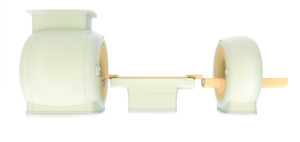by
Loren Bonner, DOTmed News Online Editor | June 11, 2012

Philips Ingenuity TF
PET MR system
From the June 2012 issue of HealthCare Business News magazine
Last summer, the FDA received a report with information related to CardioGen- 82, the generator that uses strontium-82 to provide rubidium-82 — a radioactive PET isotope in myocardial perfusion. Apparently, two airline passengers were detained when they set off radiation alarms coming through U.S. airports. Further investigation confirmed that the passengers had been exposed to excess radiation from CardioGen-82 due to a “strontium breakthrough” after having undergone PET scans, at separate cardiology centers, only a few months before traveling.
Bracco Imaging, the sole manufacturer of the rubidium-82 generator, complied with the FDA to launch an investigation into the root cause of what happened. After multiple tests and a recall of Bracco’s generators at the end of July, it was determined that the incident resulted from user error. In a statement, the FDA said that they believed the excess radiation came from strontium isotopes that were accidentally injected by the CardioGen-82, with the rubidium-82 injection at the sites.
Consequently, Bracco worked with the FDA on revising labeling and safety procedures. The company’s generators now carry new, FDA-approved warnings, as well as a series of amended rules users must obey.
“That’s the reason we could come back to market in seven months—because of all the testing and documentation we provided,” says Kim McDaniel, senior director of sales and marketing at Bracco. In February, Bracco reintroduced its rubidium generators and the product has gradually returned to market.
“We still don’t have everyone back on board yet. But we anticipate everyone to be back in July and we’ll be adding new customers after that,” says McDaniel.
Still, there’s talk that the new FDA requirements for rubidium could have an impact on the market.
“If you look at the new FDA requirements for quality control of the generator, you can’t be a high user because at some point the generator starts to spit out strontium,” says Wayne Webster, medical imaging business developer and founder of Proactics Consulting.
The market takes a turn and companies make adjustments and deals
For many PET dealers, the modality was a strong income generator until the sector crashed due to the rubidium recall.
SPECT has traditionally been the dominant modality to detect coronary artery disease in patients non-invasively. But in 2010, the Centers for Medicare and Medicaid changed its reimbursement rates to favor PET over SPECT for myocardial perfusion imaging. This is where PET began to take over and Diagnostix Plus Inc. saw a business opportunity. The company has been a key supplier of nuclear medicine equipment and service for more than 30 years. Starting in about 2007, it began upgrading older dedicated PET scanners for cardiology practices.
